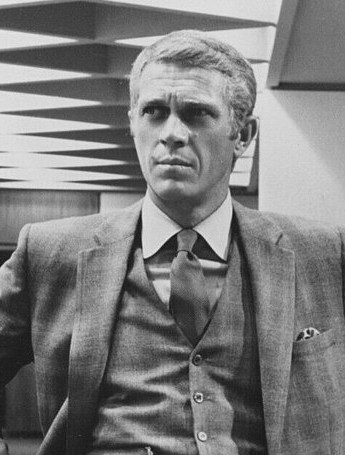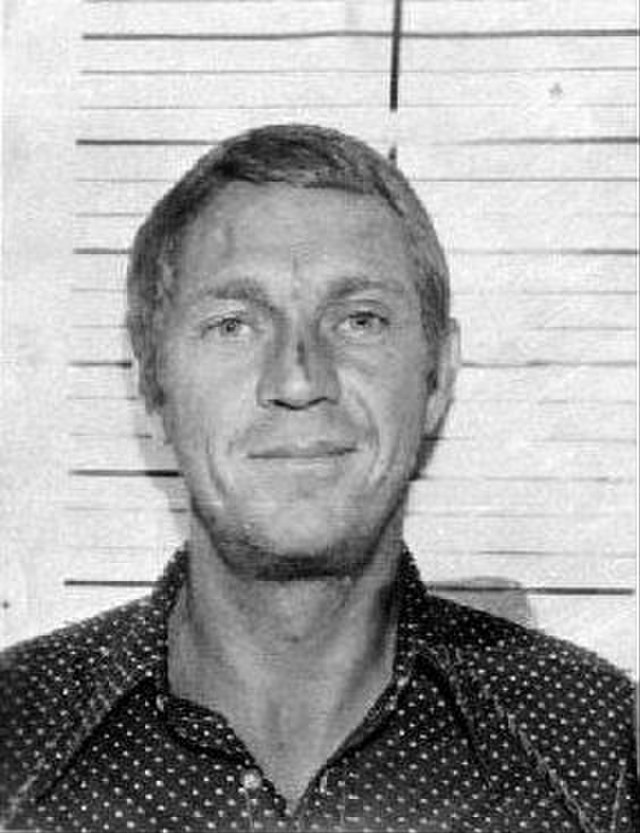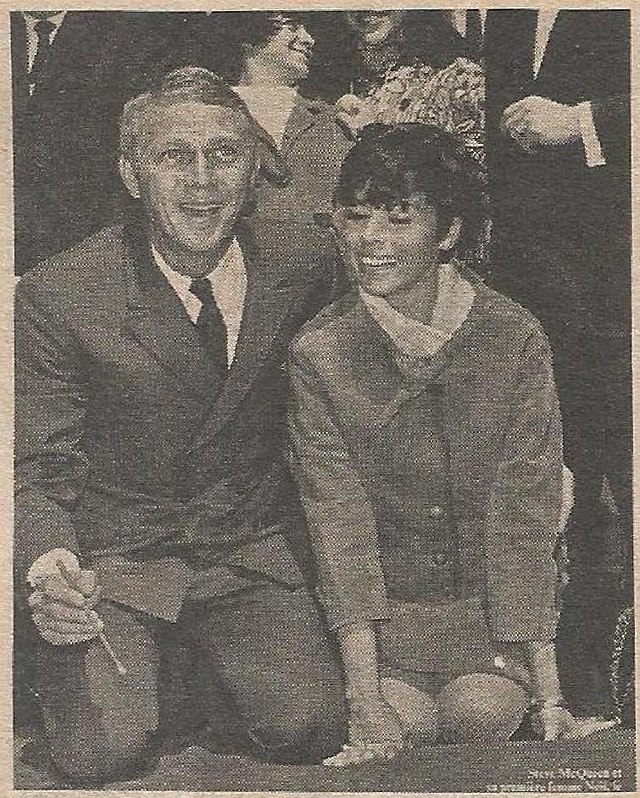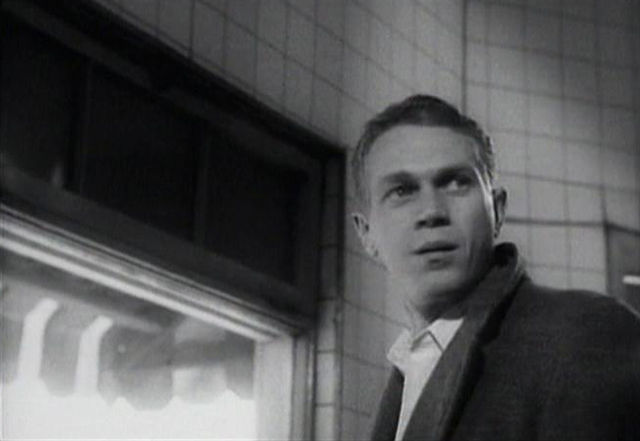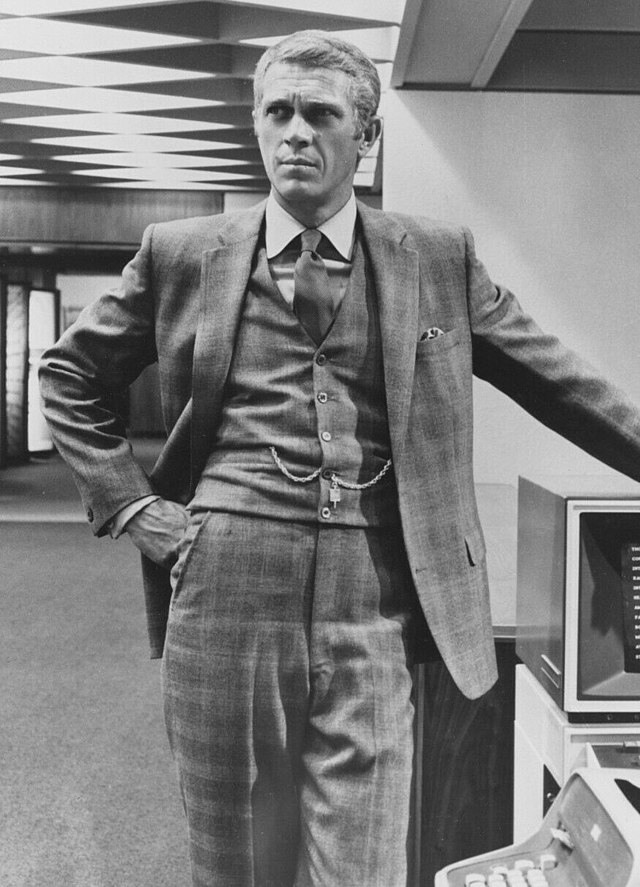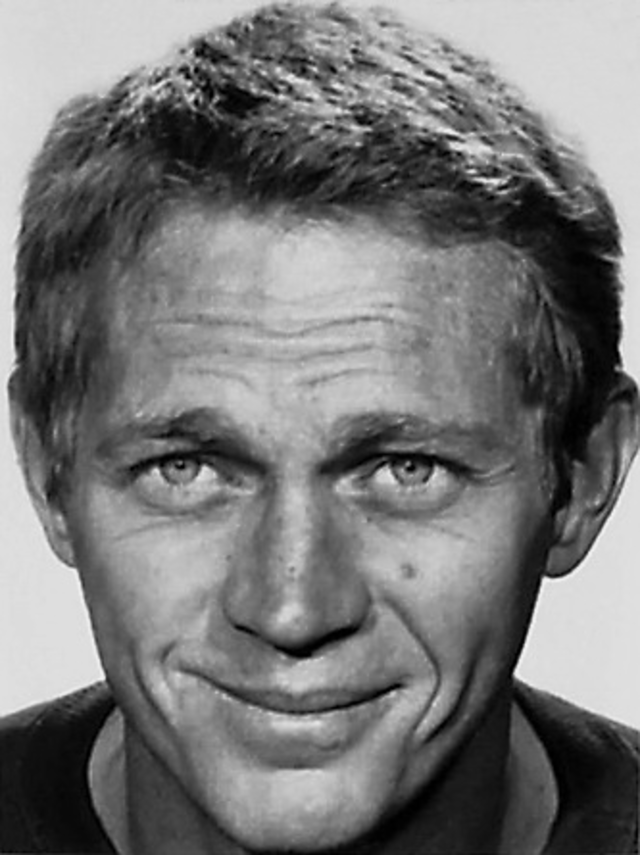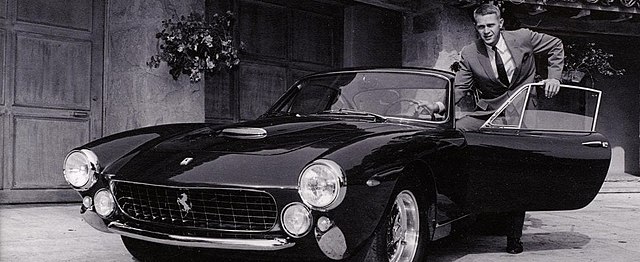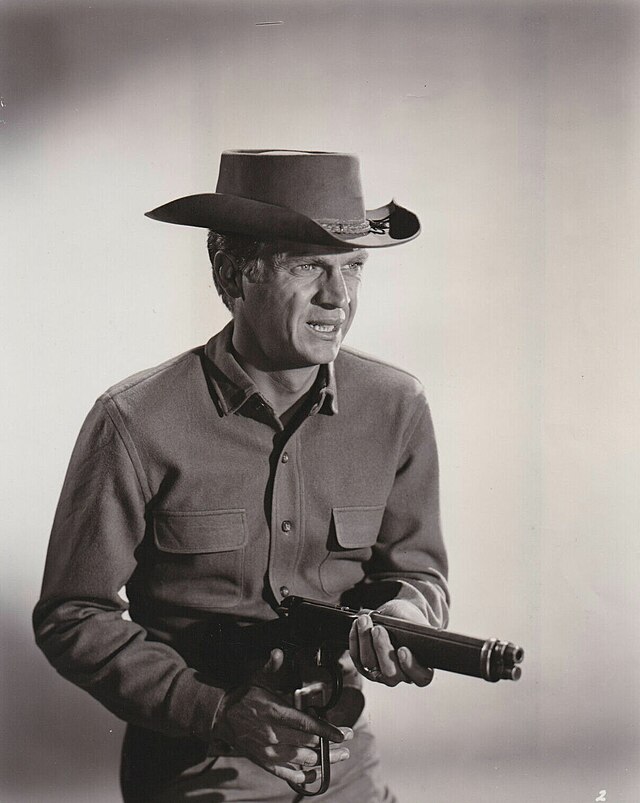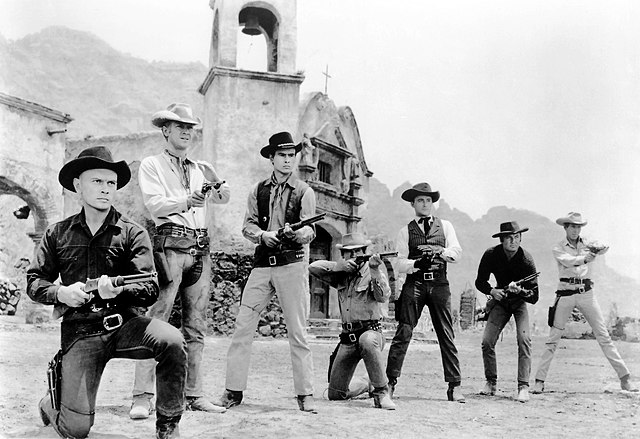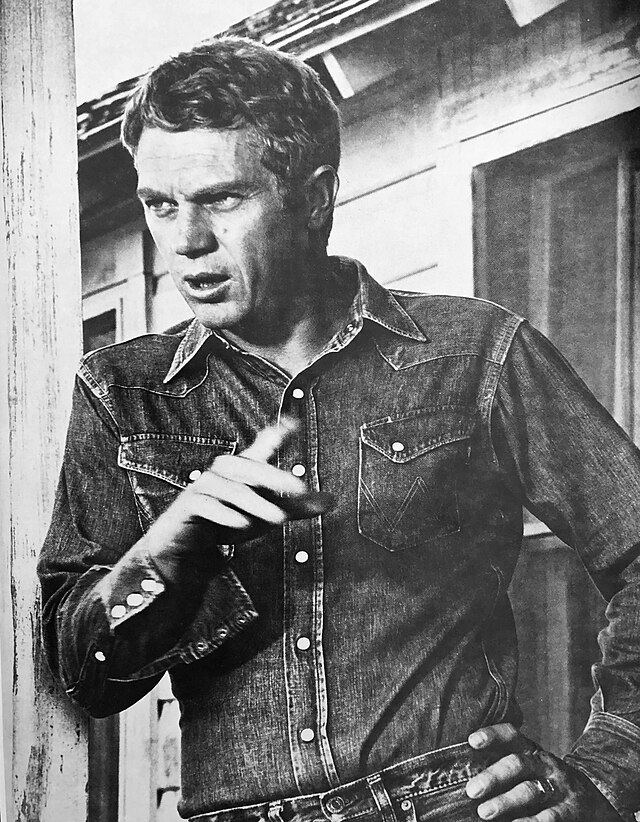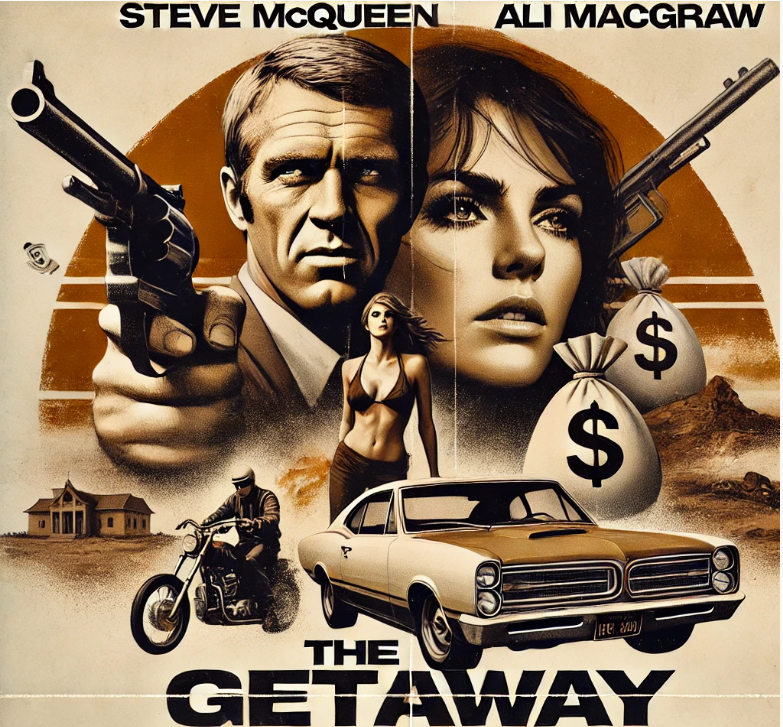Steve McQueen (1930 – 1980)
Biography and Movie Career
Steve McQueen, born Terrence Stephen McQueen on March 24, 1930, in Beech Grove, Indiana, became one of Hollywood's most enduring icons. His rugged charm, anti-hero persona, and undeniable charisma earned him the nickname "The King of Cool," solidifying his place as a cultural legend.
Early Years
McQueen's childhood was marked by turbulence. His father, a stunt pilot, abandoned the family before he was born, and his mother, struggling with alcoholism, was unable to care for him. McQueen spent much of his youth being shuttled between relatives, including a difficult stint on his great-uncle's farm in Missouri, where he developed a strong work ethic and a passion for machinery.
At the age of nine, McQueen reconnected with his mother in Indianapolis, but the relationship remained strained. He soon found himself in trouble with the law and ended up in reform school at the Boys Republic in Chino, California. It was here that McQueen began to turn his life around. He later credited the school with teaching him discipline and providing the structure he lacked in his early years.
Path Toward Stardom
After leaving reform school, McQueen joined the Merchant Marines before enlisting in the U.S. Marine Corps in 1947. Although his rebellious nature initially clashed with military life, he eventually excelled, even saving the lives of five fellow Marines during an Arctic exercise.
Following his honorable discharge in 1950, McQueen used the G.I. Bill to study acting at the Sanford Meisner’s Neighborhood Playhouse in New York City. His natural talent and intensity caught the attention of industry insiders, and he began landing small roles in theater and television. His breakout came with the TV series Wanted: Dead or Alive (1958–1961), where he played bounty hunter Josh Randall, showcasing his cool demeanor and setting the stage for his leap to film stardom.
Career Highlights
McQueen’s film career took off with The Magnificent Seven (1960), where his understated performance stole the show despite sharing the screen with established stars like Yul Brynner. His status as a leading man was cemented with The Great Escape (1963), where his motorcycle stunts became legendary.
Throughout the 1960s and 1970s, McQueen starred in a series of iconic films that captured his tough-guy persona and rebellious spirit. Bullitt (1968) featured one of the most famous car chase scenes in film history, solidifying his reputation as a high-octane action star. Other notable films include The Thomas Crown Affair (1968), Le Mans (1971), Papillon (1973), and The Towering Inferno (1974).
McQueen's passion for cars and motorcycles was not limited to the screen; he often performed his own stunts and participated in off-screen racing events. He became a skilled racer, competing in events like the 12 Hours of Sebring.
Personal Life and Marriages
Steve McQueen's personal life was as dramatic as his on-screen roles. He married three times:
• Neile Adams (1956–1972), with whom he had two children, Terry Leslie and Chad McQueen. Although the couple appeared happy, McQueen’s infidelity and erratic behavior eventually led to their divorce.
• Ali MacGraw (1973–1978), a romance that began on the set of The Getaway. Their relationship was passionate but tumultuous, with both struggling to balance their careers and personal lives.
• Barbara Minty, whom he married in 1980, shortly before his death.
McQueen was a deeply private and complex individual. While he exuded confidence on screen, he grappled with insecurity and a fierce need for independence. His passions extended beyond acting, as he immersed himself in the world of racing, collecting cars, motorcycles, and even aircraft.
Passions and Lifestyle
Steve McQueen was an avid motorsports enthusiast, a hobby that often bled into his professional life. His film Le Mans (1971) was a testament to his love of racing, though it failed to connect with audiences at the time. He also collected an impressive array of cars and motorcycles, including a prized Jaguar XKSS and a 1946 Indian Chief.
Despite his fame and wealth, McQueen retained a rugged, everyman persona. He loved outdoor pursuits like camping and dirt biking and often sought solace in nature. However, he also struggled with substance abuse and a volatile temper, traits that sometimes alienated those closest to him.
Illness and Death
In the late 1970s, McQueen's health began to deteriorate. He was diagnosed with mesothelioma, a rare and aggressive cancer linked to asbestos exposure. While it's unclear how he was exposed, speculation points to his time in the military or his use of asbestos-insulated racing suits.
Desperate for a cure, McQueen sought unconventional treatments in Mexico, including detox regimens and experimental therapies. On November 7, 1980, he succumbed to a heart attack following surgery to remove tumors from his abdomen. He was just 50 years old.
McQueen's ashes were scattered in the Pacific Ocean, in line with his wishes.
Legacy
Steve McQueen remains a Hollywood legend, celebrated for his raw talent, magnetic screen presence, and unrelenting spirit. His anti-hero image resonated with audiences during a time of cultural change, and his films continue to inspire generations of actors and filmmakers.
Beyond his cinematic achievements, McQueen's passion for motorsports and his "cool" persona have made him a cultural icon, immortalized in fashion, art, and pop culture. Despite his premature death, the "King of Cool" remains as timeless as ever.
Main Features of Steve McQueen
Height and Weight
• Height: 5 feet 9.5 inches (177 cm)
• Weight: Approximately 170 lbs (77 kg)
Body Features
• Build: Lean, athletic, and well-proportioned; McQueen maintained a fit physique, reflective of his active lifestyle that included motorsports, martial arts, and physical stunt work.
• Eyes: Striking blue, which added to his on-screen charisma.
• Hair: Light brown/blond, often kept short or tousled for a casual, rugged look.
Steve McQueen’s Vehicles
Steve McQueen’s love for vehicles—cars, motorcycles, and even planes—was as legendary as his acting career. Known as an avid collector and skilled racer, McQueen didn’t just view vehicles as possessions but as extensions of his adventurous and independent spirit. Here’s an overview of his relationship with vehicles and some of the iconic models he owned or drove:
________________________________________
Cars
Steve McQueen had a deep passion for sports cars, muscle cars, and classic automobiles, often favoring models that reflected his sense of style and need for speed.
• 1968 Ford Mustang GT Fastback (Bullitt):
McQueen famously drove this Mustang in Bullitt’s legendary San Francisco car chase. The car became synonymous with McQueen’s cool persona and remains an automotive icon. The original car sold for $3.7 million in 2020.
• Porsche 911 S (Le Mans):
McQueen drove this car in the opening scenes of Le Mans. It was also part of his personal collection, showcasing his love for high-performance European cars.
• Jaguar XKSS (1957):
One of the rarest cars in his collection, McQueen nicknamed it "The Green Rat." This sleek, road-legal version of the Jaguar D-Type race car was among his most prized possessions.
• Ferrari 250 GT Lusso (1963):
McQueen owned a custom-painted burgundy Ferrari, blending luxury and performance. This car exemplified his appreciation for precision engineering.
• Shelby Cobra 289 (1963):
Another rarity in his collection, McQueen owned this high-performance roadster designed for both the track and the road.
• Meyers Manx Dune Buggy:
McQueen drove this stylish dune buggy in The Thomas Crown Affair, showcasing his love for unconventional vehicles.
________________________________________
Motorcycles
McQueen’s passion for motorcycles rivaled his love for cars. He collected, raced, and frequently rode motorcycles for recreation and transportation.
• Triumph TR6 Trophy (1962):
This motorcycle, featured in The Great Escape, became iconic for McQueen’s daring fence-jump scene. Although stunt rider Bud Ekins performed the actual jump, the Triumph remains forever linked to McQueen.
• Indian Chief (1946):
McQueen’s favorite bike for personal rides. Its vintage style and powerful engine made it a standout in his collection.
• Husqvarna 400 Cross:
McQueen rode this off-road bike in motocross races and famously appeared with it on the cover of Sports Illustrated in 1971.
• Vincent Black Shadow (1952):
A highly coveted bike among enthusiasts, McQueen owned one of these rare, British-made motorcycles.
________________________________________
Racing Career
McQueen wasn’t just a collector—he was an accomplished racer in both cars and motorcycles. Some highlights include:
• 12 Hours of Sebring (1970):
McQueen, driving with Peter Revson in a Porsche 908/02, placed second overall despite racing with a broken foot.
• Baja 1000:
McQueen regularly competed in this grueling off-road desert race, showcasing his love for challenging terrain and speed.
________________________________________
Planes
McQueen’s fascination with machinery extended to the skies. He was a licensed pilot and owned several vintage aircraft, including a 1945 Boeing Stearman biplane, which he used for leisurely flights.
Steve McQueen’s and his Chukka Boots
Steve McQueen's chukka boots are nearly as iconic as the man himself, representing his effortlessly cool style and becoming a staple of his rugged, masculine image. Here’s what makes McQueen’s relationship with chukka boots so noteworthy:
________________________________________
The Connection
• The Brand:
McQueen often wore Playboy chukka boots, a distinctive style crafted by the C&J Clark company (Clark’s) in England. These boots were made of high-quality suede and featured crepe soles, which added comfort and durability.
• Why He Loved Them:
McQueen appreciated their blend of style and practicality. The boots were casual enough for his off-screen life yet stylish enough to pair with his outfits in iconic roles. They aligned perfectly with his minimalist, timeless wardrobe.
________________________________________
On-Screen Appearances
• The Great Escape (1963):
McQueen famously wore a pair of sand-colored chukka boots as Captain Virgil Hilts ("The Cooler King"). They paired seamlessly with his bomber jacket and khakis, embodying his rugged soldier persona.
• Bullitt (1968):
While more subtle in this film, McQueen’s wardrobe—including his trademark chukkas—helped establish his effortlessly cool detective look.
________________________________________
Off-Screen Style
McQueen frequently wore chukka boots in his personal life. Whether paired with jeans, chinos, or even tailored suits, the boots became a hallmark of his relaxed yet polished style. Their versatility mirrored McQueen’s persona: practical, understated, and undeniably cool.
________________________________________
Enduring Legacy
• Fashion Icon:
McQueen's affinity for chukka boots helped solidify their place in men’s fashion, particularly among those looking to emulate his rugged, casual sophistication.
• Modern Revival:
Brands like Clarks and other premium footwear companies have reissued versions of the Playboy chukka boot due to its association with McQueen, often branding them as "Steve McQueen-inspired" editions.
• Timeless Appeal:
The chukka boot, largely thanks to McQueen, remains a staple in men’s wardrobes, symbolizing a blend of classic style and rugged charm.
________________________________________
In essence, McQueen’s chukka boots were more than footwear—they were an integral part of his iconic style, representing a combination of practicality, simplicity, and effortless coolness that continues to inspire fashion to this day.
Car Chase Video from Bullit
Analysis of Steve McQueen’s Acting Style
Steve McQueen's acting style was an embodiment of subtle intensity and naturalistic realism, a combination that defined his on-screen persona and made him a magnetic presence in every role he took on. His performances were often understated, yet they carried an undeniable weight, drawing audiences in without overt theatricality.
________________________________________
Minimalism and Economy of Expression
Steve McQueen mastered the art of "less is more." He had a way of communicating emotions and intentions with minimal dialogue, relying instead on body language, facial expressions, and small, deliberate movements. Whether it was a quick glance, a clenched jaw, or a slight smirk, McQueen's subtlety made his characters feel authentic and relatable. He trusted his audience to read between the lines, which added layers of complexity to his roles.
• In The Great Escape, his silence often spoke louder than words. His cool, calculated demeanor as Captain Hilts conveyed a sense of leadership and defiance without the need for grand speeches.
• In Bullitt, his quiet intensity during the famous car chase emphasized his character’s determination and focus, making the scene iconic.
________________________________________
Cool, Rebellious Charm
McQueen exuded an effortless "cool" that became his trademark. His characters were often rugged individualists, anti-heroes who operated by their own rules. This rebel energy resonated with audiences, especially during the cultural shifts of the 1960s and 1970s.
• His portrayal of Vin Tanner in The Magnificent Seven exemplified his charisma. Even when surrounded by a stellar ensemble cast, McQueen stood out with his quiet confidence and natural charm.
• In The Thomas Crown Affair, McQueen's portrayal of the suave and cunning bank robber displayed a more refined aspect of his cool persona, adding depth to his screen presence.
________________________________________
Physicality and Authenticity
McQueen was a highly physical actor who brought a visceral realism to his performances. His background in motorsports and love for action translated seamlessly to the screen. He often performed his own stunts, lending credibility to action sequences and making them feel organic.
• In Le Mans, his deep knowledge of racing made every scene believable, blurring the line between character and actor.
• In Papillon, his physical transformation and grueling portrayal of a man enduring the harsh conditions of a French penal colony demonstrated his willingness to push his body to its limits for the sake of authenticity.
________________________________________
Reluctant Vulnerability
While McQueen’s characters were often stoic and tough, he occasionally allowed glimpses of vulnerability to break through. These moments of emotional exposure added depth and relatability to his performances.
• In Junior Bonner, his portrayal of an aging rodeo star revealed a softer, more introspective side. The film delved into themes of family, failure, and the passage of time, giving McQueen a chance to show his range.
• In Papillon, his desperation and determination to survive were palpable, making the audience root for him even more.
________________________________________
Relatability and Naturalism
Unlike many of his contemporaries, McQueen avoided overly dramatic or theatrical performances. His style was grounded, with a natural cadence to his speech and movements that mirrored real life. He rarely seemed like he was "acting," which made his characters feel genuine.
• In Hell Is for Heroes, his portrayal of a battle-worn soldier captured the exhaustion, cynicism, and bravery of a man pushed to his limits.
• Even in a larger-than-life disaster film like The Towering Inferno, McQueen maintained a grounded approach, making his character relatable amid the chaos.
________________________________________
Charisma Without Effort
Perhaps McQueen's greatest strength as an actor was his ability to command attention without demanding it. He had a magnetic presence that drew viewers in, whether he was leading a motorcycle chase or sitting silently in a room. His charisma was effortless, a quality that cannot be taught or replicated.
________________________________________
Legacy of His Acting Style
Steve McQueen’s acting style remains a benchmark for understated brilliance. His ability to balance cool detachment with emotional depth influenced generations of actors, including modern stars like Brad Pitt and Daniel Craig. He proved that acting doesn't have to be loud to be impactful and that sometimes, the smallest gestures can leave the biggest impressions.
Memorable Quotes from Steve McQueen
On Life and Living
• “I live for myself and I answer to nobody.”
A statement that perfectly encapsulates McQueen's rebellious, independent spirit.
• “Racing is life. Anything before or after is just waiting.”
A famous line from the movie Le Mans (1971) that became synonymous with McQueen's passion for motorsports and his view of life’s intensity.
• “When I believe in something, I fight like hell for it.”
This speaks to his determination, both on-screen and off, and his unwavering commitment to what he valued.
• “I’d rather wake up in the middle of nowhere than in any city on Earth.”
A testament to his love of freedom, solitude, and the great outdoors.
________________________________________
On Acting
• “I'm not sure whether I'm an actor who races or a racer who acts.”
A humorous nod to his dual passions for acting and motorsports, which defined much of his identity.
• “In my own mind, I’m not sure that acting is something for a grown man to be doing.”
This reveals McQueen's modest, almost skeptical view of his profession, despite his massive success.
• “Stardom equals freedom. It’s the only equation that matters.”
A reflection of how he saw success in Hollywood as a way to escape constraints and live life on his own terms.
________________________________________
On Rebellion and Individuality
• “I’m not sure if I’m an actor who is a rebel, or a rebel who became an actor.”
A quote that underscores McQueen's natural alignment with anti-hero roles and his own nonconformist personality.
• “I can’t act. What I can do is be myself on screen.”
A humble yet powerful insight into his naturalistic acting style that relied on authenticity rather than technicality.
________________________________________
On Success and Fame
• “You only go through life once, and if you play it right, once is enough.”
McQueen’s philosophy on living life to the fullest, which he embodied both in his work and personal adventures.
• “When a kid didn’t have any love when he was small, he begins to wonder if he’s good enough. That’s what happened to me.”
A poignant reflection on his troubled childhood and how it shaped his drive for success and recognition.
• “The main thing I’ve always wanted to do is to be the best actor in the business. Even better than the best.”
A rare acknowledgment of his ambition and determination to excel in his craft.
________________________________________
Miscellaneous Cool
• “I’m not the next James Dean. I’m me.”
McQueen distancing himself from comparisons to other actors and asserting his individuality.
• “If I hadn’t made it as an actor, I might have wound up a hood.”
A candid remark on how his tough upbringing and love of risk shaped his personality and career.
• “I don’t believe in that phony hero stuff.”
A reflection of his preference for flawed, human characters rather than idealized figures.
What Others said about Steve McQueen
Peers and Co-Stars
• Paul Newman (actor):
“Steve McQueen was one of the most honest actors I’ve ever seen. He wasn’t a phony. What you saw on screen was what you got in real life.”
Newman admired McQueen’s authenticity, both on and off screen.
• Ali MacGraw (actress and second wife):
“He was this combination of tough guy and little boy. He was the most mesmerizing man I had ever met.”
MacGraw highlighted McQueen's complex personality, which combined rugged masculinity with vulnerability.
• Dustin Hoffman (actor, Papillon co-star):
“Steve was a true professional. He had this quiet intensity that made him unique. You knew you were in the presence of someone who would go down in history.”
Hoffman praised McQueen’s dedication and his singular ability to draw attention without trying.
• Yul Brynner (actor, The Magnificent Seven co-star):
“Steve McQueen could say more with a single look than most actors could say with a monologue.”
Despite their on-set rivalry, Brynner acknowledged McQueen’s extraordinary ability to command the screen.
________________________________________
Directors and Filmmakers
• John Sturges (director of The Magnificent Seven and The Great Escape):
“Steve McQueen didn’t just act. He became the character. He was one of those rare actors who made everything he did look completely effortless.”
Sturges was instrumental in McQueen’s rise to stardom and admired his natural talent.
• Sam Peckinpah (director of Junior Bonner):
“McQueen had a quiet charisma that no one could replicate. He was the guy every man wanted to be and every woman wanted to be with.”
Peckinpah lauded McQueen’s universal appeal and ability to connect with audiences.
• Norman Jewison (director of The Thomas Crown Affair):
“Steve was fiercely independent. He didn’t care about Hollywood’s rules. He cared about being real, and that’s what made him a legend.”
________________________________________
Friends and Colleagues
• James Garner (actor):
“Steve was competitive, sometimes to a fault, but he was always genuine. You couldn’t help but respect him for that.”
Garner, who knew McQueen through Hollywood’s inner circles, appreciated his raw honesty.
• Bruce Lee (martial artist and close friend):
“Steve was a fighter. He was strong in both body and spirit, and he had this incredible drive to succeed.”
Bruce Lee and McQueen trained together in martial arts, and their mutual respect ran deep.
• Barbara Minty McQueen (third wife):
“He was a complicated man. Tough but sensitive, generous but guarded. He lived life on his own terms.”
Minty captured the dichotomy of McQueen’s personality in her reflections.
________________________________________
Cultural Observers and Critics
• Roger Ebert (film critic):
“McQueen didn’t just play characters; he inhabited them. He had a rare ability to make you forget he was acting.”
Ebert highlighted McQueen’s naturalistic acting style and screen presence.
• Quentin Tarantino (filmmaker):
“McQueen’s cool wasn’t forced; it was organic. He wasn’t just a movie star. He was a cultural movement.”
Tarantino, a lifelong admirer, credited McQueen with shaping the archetype of the modern anti-hero.
Awards and Recognition
Academy Awards (Oscars)
• Nomination:
o Best Actor in a Leading Role for The Sand Pebbles (1966).
McQueen’s only Oscar nomination, recognizing his powerful performance as Jake Holman, a naval engineer navigating moral and political challenges in 1920s China.
________________________________________
Golden Globe Awards
• Nomination:
o Best Actor in a Motion Picture – Drama for The Sand Pebbles (1967).
o Best Actor in a Motion Picture – Musical or Comedy for The Reivers (1970).
o Best Actor in a Motion Picture – Musical or Comedy for Tom Horn (1980).
While he didn’t win a Golden Globe during his lifetime, his nominations highlighted his versatility in both dramatic and comedic roles.
________________________________________
Primetime Emmy Awards
• McQueen was never nominated for an Emmy, despite his breakout role in the television series Wanted: Dead or Alive (1958–1961). However, his impact on television paved the way for his film success.
________________________________________
Other Major Awards and Recognition
National Board of Review (NBR):
• Winner:
o Best Actor for The Sand Pebbles (1966).
A recognition of his nuanced and heartfelt performance as Jake Holman.
Laurel Awards:
• McQueen was a frequent favorite in the Laurel Awards, a fan-voted recognition of popular stars and films in the 1950s–70s:
o 2nd Place: Male Star of the Year (1963, 1968, 1969).
o 3rd Place: Action Star of the Year (1967).
Photoplay Awards:
• McQueen was honored by Photoplay Magazine during the height of his career as one of the most popular actors of his era.
________________________________________
Posthumous Recognition
Hollywood Walk of Fame
• Star Location: 6834 Hollywood Boulevard.
McQueen was posthumously honored with a star on the Hollywood Walk of Fame for his contributions to the motion picture industry.
Legacy Awards and Tributes:
• McQueen has been celebrated in numerous retrospectives and tributes over the years, highlighting his influence on modern cinema and his enduring status as a cultural icon.
Motor Racing Legacy:
• In motorsport circles, McQueen is widely regarded as a symbol of the passion and artistry of racing. The 12 Hours of Sebring endurance race named a corner after him to honor his participation in the sport.
________________________________________
Cultural Recognition
• In 2007, McQueen was inducted into the Motorcycle Hall of Fame for his contributions to motorcycling culture and his influence in popularizing the sport.
• His likeness and style remain iconic in fashion and art, influencing brands like Tag Heuer and Persol, which have incorporated his image into their campaigns.
________________________________________
Impactful Legacy
While Steve McQueen’s award tally may not rival those of some of his contemporaries, his recognition lies in his unparalleled influence on film and popular culture. His performances, coupled with his rebellious "cool" factor, have made him an enduring legend whose work is still celebrated today.
Movies Starring Steve McQueen
1950s
• 1953: Girl on the Run
McQueen's uncredited film debut as an extra. A carnival thriller involving murder and deception.
• 1956: Somebody Up There Likes Me
Another uncredited role as a gang member in this boxing biopic of Rocky Graziano starring Paul Newman.
• 1958: The Blob
McQueen’s first leading role as a teenager who tries to warn his town about a gelatinous alien creature devouring everything in its path.
• 1959: Never Love a Stranger
McQueen plays a small role as Martin Cabell in this crime drama about an orphan caught in a life of crime.
• 1959: The Great St. Louis Bank Robbery
A crime thriller in which McQueen stars as a college dropout involved in a real-life bank heist that goes wrong.
________________________________________
1960s
• 1960: The Magnificent Seven
McQueen shines as Vin Tanner, one of seven gunmen hired to protect a Mexican village from bandits in this iconic Western.
• 1961: The Honeymoon Machine
A comedic caper about three Navy men who use a supercomputer to predict roulette outcomes in Venice.
• 1962: Hell Is for Heroes
McQueen stars as a battle-hardened soldier who leads a small group of American troops against a much larger German force in World War II.
• 1963: The Great Escape
In this WWII classic, McQueen plays Captain Hilts, "The Cooler King," leading Allied POWs in a daring escape from a German prison camp.
• 1965: Baby the Rain Must Fall
A dramatic role as a troubled musician recently released from prison, struggling to reconnect with his wife and child.
• 1966: Nevada Smith
A Western prequel to The Carpetbaggers, McQueen plays a young gunslinger seeking revenge on the outlaws who killed his parents.
• 1966: The Sand Pebbles
McQueen earned an Oscar nomination for his role as a Navy engineer stationed in 1920s China during political upheaval.
• 1968: The Thomas Crown Affair
McQueen stars as a wealthy, suave bank robber who plays a high-stakes game of cat and mouse with an insurance investigator (Faye Dunaway).
• 1968: Bullitt
In one of his most famous roles, McQueen plays Detective Frank Bullitt, chasing mobsters through San Francisco in an iconic car chase.
• 1969: The Reivers
A coming-of-age comedy-drama set in early 1900s Mississippi, where McQueen plays a mischievous farmhand who takes a boy on an adventure.
________________________________________
1970s
• 1971: Le Mans
McQueen stars as a professional race car driver competing in the grueling 24 Hours of Le Mans, blending his love for motorsports with cinema.
• 1972: Junior Bonner
A rare character-driven role as an aging rodeo rider returning to his hometown to compete one last time while dealing with family struggles.
• 1972: The Getaway
McQueen stars as a recently paroled bank robber who goes on the run with his wife (Ali MacGraw) after a heist goes wrong.
• 1973: Papillon
In this prison escape epic, McQueen plays Henri "Papillon" Charrière, a wrongly convicted man who plans a daring escape from a French penal colony.
• 1974: The Towering Inferno
McQueen stars as the cool-headed fire chief in this star-studded disaster film about a fire engulfing a high-rise building.
• 1977: An Enemy of the People
A rare role in a dramatic adaptation of Henrik Ibsen’s play, McQueen plays a doctor who exposes dangerous water contamination in his town.
• 1978: Tom Horn
A Western inspired by real events, McQueen stars as Tom Horn, a legendary frontier scout wrongfully accused of murder.
• 1980: The Hunter
McQueen's final film role as a modern-day bounty hunter dealing with dangerous criminals and personal challenges.

